This update covers OU-JLIC’s activity from the last Board email at the end of March through the Friday right after Pesach (4/17). One thing I am hearing from the educators is while there is all this activism, creative activity, chesed/support and online Torah opportunities the most crucial element of their work has been the personal connections and relationships. Some examples of critical instances are related below. Others I did not want to include due to sensitivity and Tznuit, but the educators have been a critical lifeline to students, alumni and families in crisis. This in addition to the Chizuk and guidance they are giving on a regular basis to students that are not in crisis, but still needing support. Additionally, in this report you will find that even with their own Pesach concerns looming, educators continued helping students and families deal with both the challenges of COVID-19 and to offer a dazzling array of Torah learning opportunities, and help prepare many students and alumni for their first time “making” Pesach. Their efforts leave me awed and humbled.
Impact In Numbers
-
- 184 advisory meetings took place with OU-JLIC educators and Hillel, Student Groups, or other groups/organizations
- 553 virtual coffee dates (including chevrutah learning and check ins)
- 1,798 texting and whatsapp check-ins with students
- 550 students were delivered food by OU-JLIC educators
- 204 Chaburot and Shiurim were given last week by OU-JLIC educators
- 3,581 students and their family members took part in OU-JLIC chaburot and chevrutot
- 54 non-learning events and programs
- 459 divrei Torah were sent by OU-JLIC educators to 14,061 people
- 2,174 Halachic questions were answered by OU-JLIC educators and 858 of these questions were related to COVID-19
- 18 chattanim/kallot were taught by OU-JLIC
Personal Connections
- Three students (brothers) who are regulars at Drs. Rod and Daniella Najibi’s (Western University of Health Sciences) Shabbat shiur (currently being held on Zoom, Thursday nights) lost two grandparents to COVID-19. Drs. Rod and Daniella, have helped the students by answering their questions, like how to handle kadish without a minyan, and dedicating this past week’s shiur to their grandparents.
- Two Brooklyn College students lost their fathers and Shira Boshnack (OU-JLIC Brooklyn College) arranged meals for the families for Yom Tov and the following weeks. The Boshnacks also received calls from three students in crisis and two of these students called on Yom Tov.
- A Rutgers student called the Wohlgelerntners after midnight in a panic with a mental crisis exacerbated by being stuck with his family amid other triggers. He said that his OU-JLIC educator was one of the only people he felt comfortable reaching out to.
- An IDC student who was hospitalized this year for a suicide attempt and depression, will be spending Pesach at home, alone with her mother who she doesn’t have a good relationship with. While she has the proper medical and professional help, the student needed religious guidance to ensure she is healthy over shabbat and chag. Rav Josh and Margot Botwinick connected the student with Rav Schrader, who helped to explain accommodations she can have because of her mental illness and stressed the importance of Pikuach nefesh within halachah. The student told Margot, she was so appreciative knowing that the Halacha was sensitive to her needs.
- Rabbi Jon Singer (University of Chicago) has been learning daily with a student who lost his father last year. They started learning daily after shacharit since the shiva and have been continuing via zoom since social distancing started. The yahrzeit is in a few weeks and they are planning to do a virtual siyum. The student has expressed it’s been a very meaningful experience for him.
- Rabbi Yonaton Hirschhorn (OU-JLIC UMD) learned Masechet Makkot with a student this past year. The student is a bechor and asked Rav Yonaton to help him finish the masechet in time for Erev Pesach so that he could make a siyum. This was the first (!) siyum the student had ever made in his life and the student and his family were incredibly proud of this achievement. Rav Yonaton “called in” for the siyum.
- A student needing to go to the hospital for a Coronavirus-related issue couldn’t get their car to start. They called Rabbi Rafi and Ariella Leicht (UMass), for jumper cables. While they didn’t own any, the Leichts found jumper cables from neighbors and went to the student’s house, where they attempted to jump-start the car, all while maintaining safe social distancing. After 20 minutes their car finally started again.

- Rabbi Noam and Shiffy Friedman (OU-JLIC Columbia/Barnard) helped several students navigate difficult life situations related to COVID-19: A student with a complex home situation, an international student who wanted to return home and a student with an ill family member.
- Rabbi Aaron Greenberg was a Mesader Kiddushin for a wedding that adhered to the heath guidelines and social distancing.
- Jersey City Shooting Update – The OU-JLIC at NYU community sent immediate rent relief to the family of Miguel Rodriguez, who was murdered in the kosher supermarket attack in Jersey City in December. His sister-in-law who became the family’s main breadwinner lost her job and so they sent her money to help her through this period. OU-JLIC is also looking to help Miguel’s daughter in her college applications, by offerijing her VIP treatment at any OU-JLIC campus she may visit.
Pesach — preparing student
- Rabbi Aryeh and Sharona Kaplan (UCLA) hosted an Instagram live, showcasing 10 tips to optimize the Seder and make it meaningful. For those unfamiliar with hosting or adapting a much smaller Seder, their practical tips – from utilizing decoration and props, to reciting Maggid in the living room instead of a table, to providing Haggadot with different commentaries and inviting different participants to ask one of the four questions in different foreign languages- offered concrete ways to personalize and optimize the Seder experience! 59 students participated.
- For mishmar University of Chicago had a mock seder, where 12 students and the OU-JIC educators (Rabbi Jon and Orly Singer) prepared divrei Torahs, each on a different section of the seder. They went in order sharing thoughts and discussing the steps of the seder.
- Rabbi Yonatan and Avital Hirschhorn (University of Maryland) led their students in a spiritual preparation for Pesach. 35 students were treated to twelve 5 minute divrei Torah given by students as well as two from the Hirschhorns.
- Pre-Pesach Crash Course and Q&A – Margot Botwinick’s mother joined her son-in-law, Rabbi Josh (IDC Herzliya) to help teach the students of IDC how to make Pesach. 60 students tuned in through Zoom and Facebook.
- Zoom Q&A – After getting several student requests to talk through how to make Pesach at home, Rabbi Alex Ozar and Lauren Steinberg (Yale) organized a Zoom Q&A session, and one student brought her whole family!

- Many of our educators have been putting together resources to help their students and alumni make Pesach for the first time. In just one example, Rabbi Josh and Margot Botwinick (IDC) put together a guide for students making Pesach on their own for the first time and posted this video on Facebook: https://www.facebook.com/1505952096150246/posts/2875196675892441/?vh=e&d=n going through 8 easy Pesach recipes for students that never cooked for Pesach before. Within less than 24 hours it already had over 2,300 views.
Pesach — feeding the body and soul
OU-JLIC educators took care of any students stuck on campus by providing them with home-made or catered meals.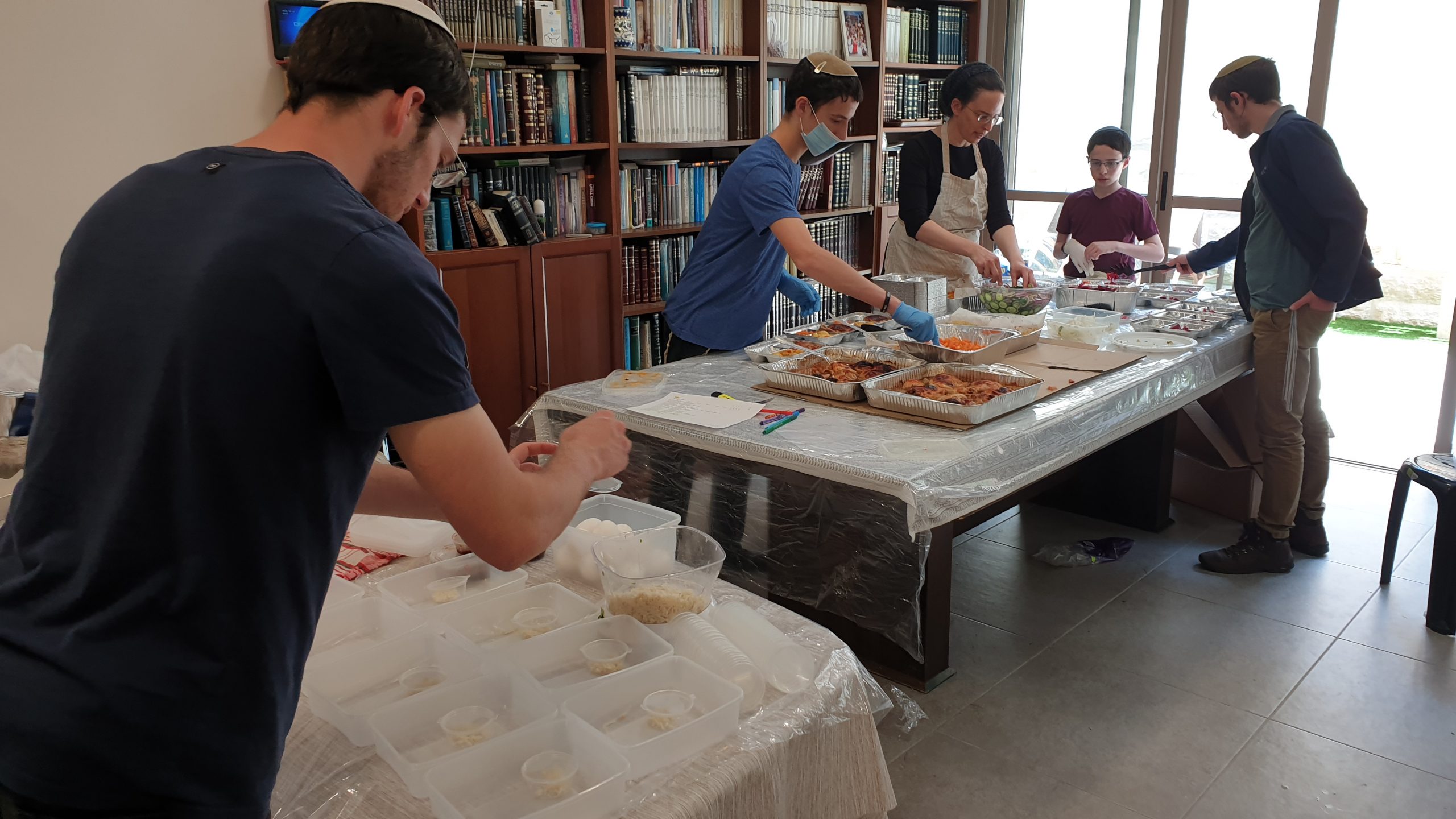
- At Bar- Ilan University, more than 100 students received a full Pesach kit (including a full chag meal). They created a special Hagadda in the week leading up to Pesach with Divrei Torah and input from students and leaders and over 140 Haggadot were given out to students. Rabbi Yehuda and Chagit Peles also delivered surprise packages to 10 Anglo students on behalf of their parents. Chagit Peles ran a Pesach themed Healthy Baking Workshop via zoom with over 150 participants. Click here to listen to a touching whatsapp voice note sent by one of the students.
- Rabbi Bryan Borenstein (OU-JLIC CSUN) raised approximately $11,000 for Maot Chitim and distributed it to needy students and their families.
- Rabbi David and Sarah Kasdan (OU-JLIC Cornell) gave away 50 (!!) seder plate kits, along with matzah and grape juice for students still in Ithaca. Pickup was on their front porch and they also arranged delivery for students unable to leave their homes.
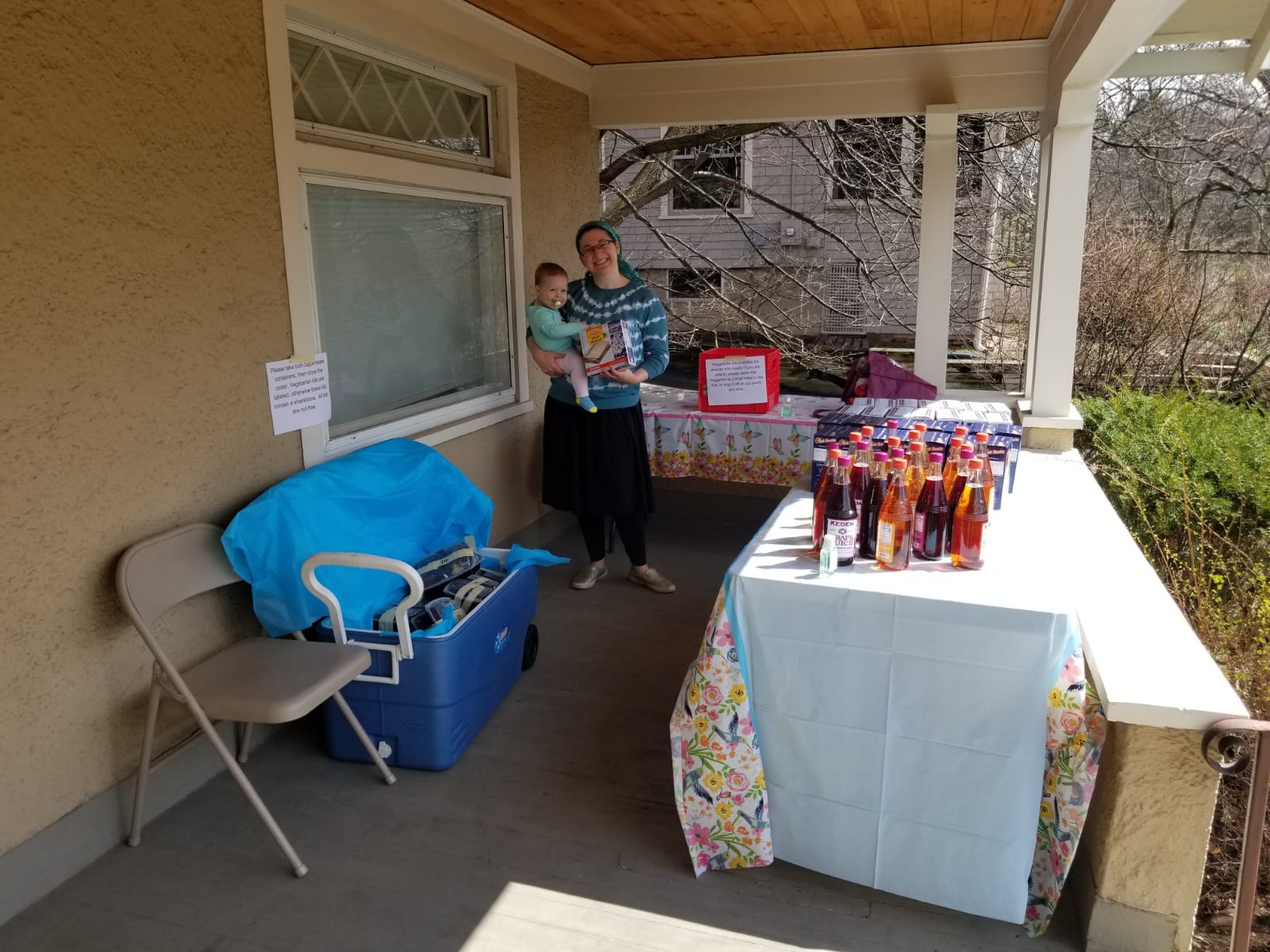

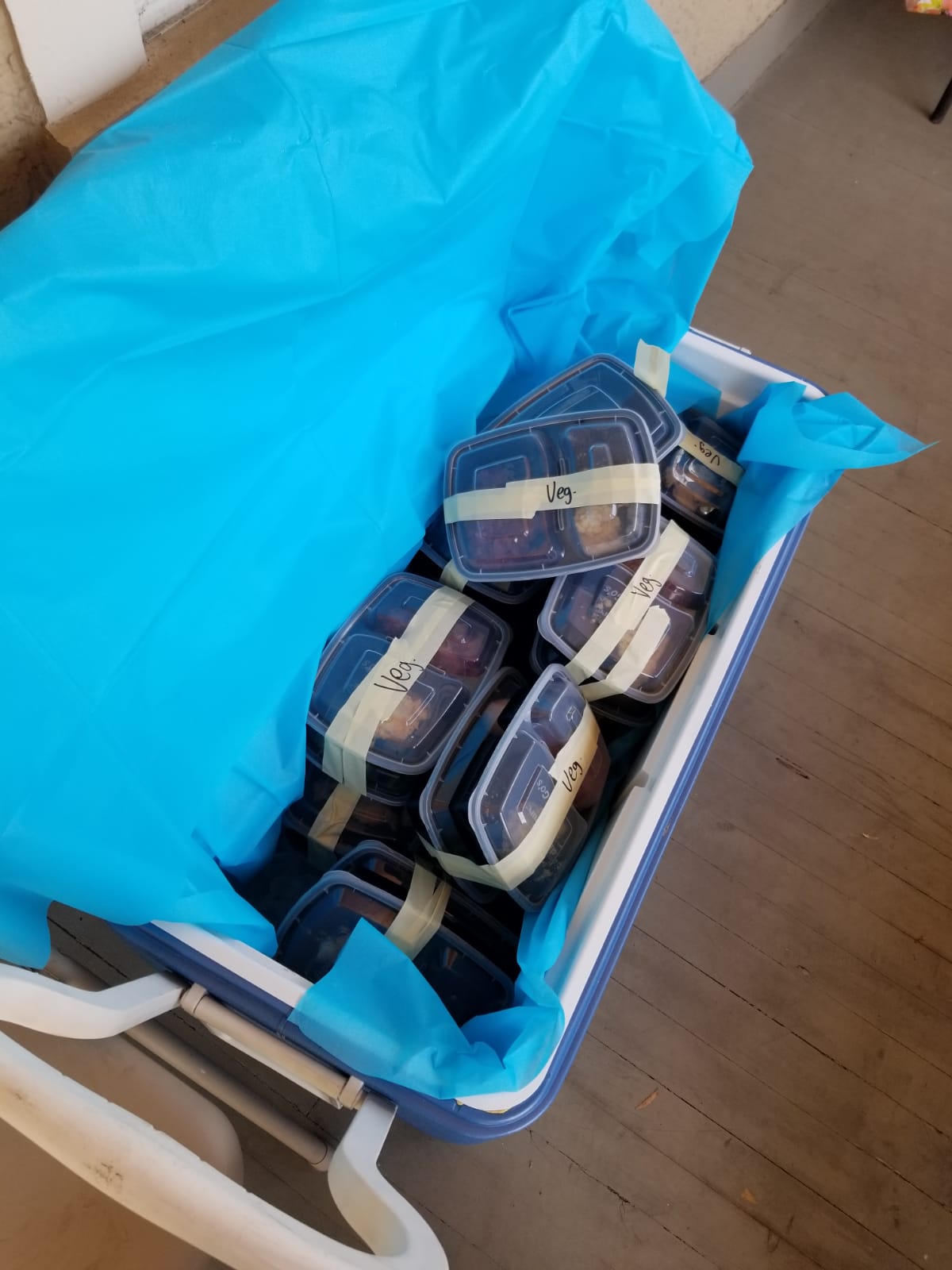
- Rabbi Josh and Margot Botwinick (OU-JLIC IDC-Herzliya) spoke to the IDC administration about the many students who would be in isolation over Chag. IDC University and OU-JLIC joined forces and organized a mehadrin caterer to pack individual Pesach meals over Chol Hamoed for pick-up. 120 students signed up for these meals.
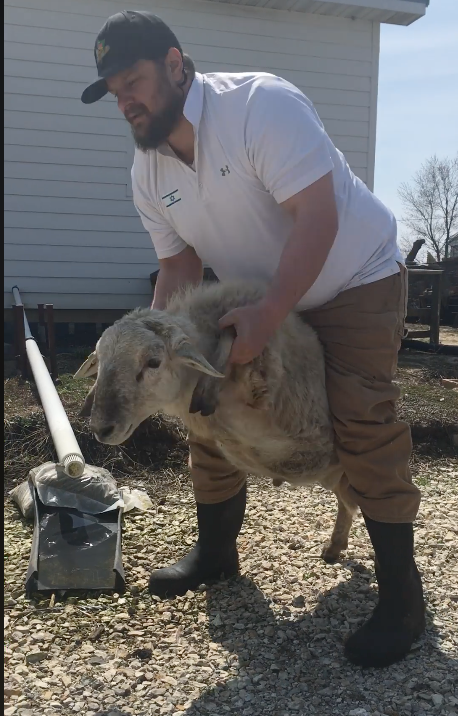
- Rabbi Shlomo Schachter and Ahava Schachter-Zarembski (OU-JLIC University of Illinois) cooked an incredible amount of food for students over Pesach because the Campus University kosher kitchen was closed. They packaged 18 seders to go and cooked a total of 144 Passover Meals to go. This involved kashering their kitchen early, securing funding for everything, buying a lamb to shecht (Rabbi Shlomo is a certified shochet), and sourcing food from Chicago, St. Louis and Baltimore.
- A few students were stuck on campus for Pesach at Princeton and UMD. The Hirschhorns (OU-JLIC UMD) and the Kahns (OU-JLIC Princeton) cooked and distributed homemade meals for students for Chag.
- Rabbi Alex Ozar and Lauren Steinberg (OU-JLIC Yale) organized a bulk Pesach food order for students and others in the community and then organized distribution of the food.
- Rabbi Joe Wolfson and Corinne Shmuel (NYU) have turned over $2,000 in donations into Pesach food for isolated seniors, shopped for and delivered by their army of student volunteers.
- NYU students continued their Killing Covid with Kindness Initiative and their acts of chesed were written up in multiple news outlets including on Arutz Sheva.
Program Highlights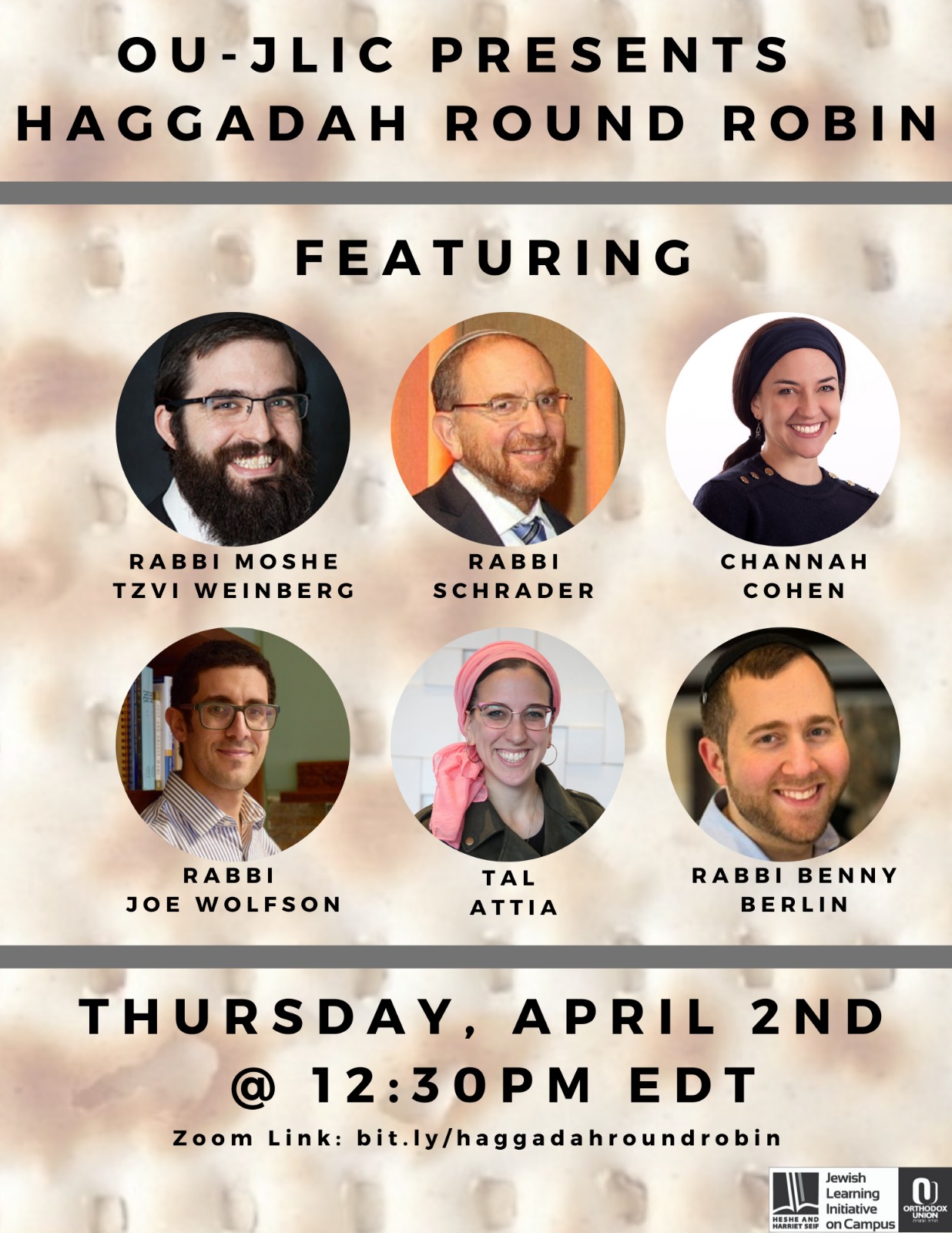
- Rabbi Joe Wolfson and Corinne Shmuel (NYU) were asked to provide for the Passover needs of the 100 Jewish COVID-19 patients in the emergency Javits Center COVID Hospital. They found a donor and provided the patients with Matzah, kosher for Pesach food, and haggadot.
- COVID-19 couldn’t stop Queens College’s annual Haggadah Round Robin, which moved online and took place over Zoom. 60 students tuned in to prepare for their sedarim by hearing a rotation of speakers present on topics from the haggadah. The rotation included Rabbi Menachem Schrader (OU-JLIC National), Rav Benny Berlin (Queens College), Channah Cohen (Queens alumna educator), Rabbi Joe Wolfson (NYU), Tal Atti (Binghamton University), and Rabbi Moshe Tzvi Weinberg.
- With their students, Rabbi Mati and Shira Kahn (Princeton University), compiled a community haggadah combining divrei Torah and Princeton minhagim/shtick. They have printed and bound the haggadah and will be sending them out to all their students!
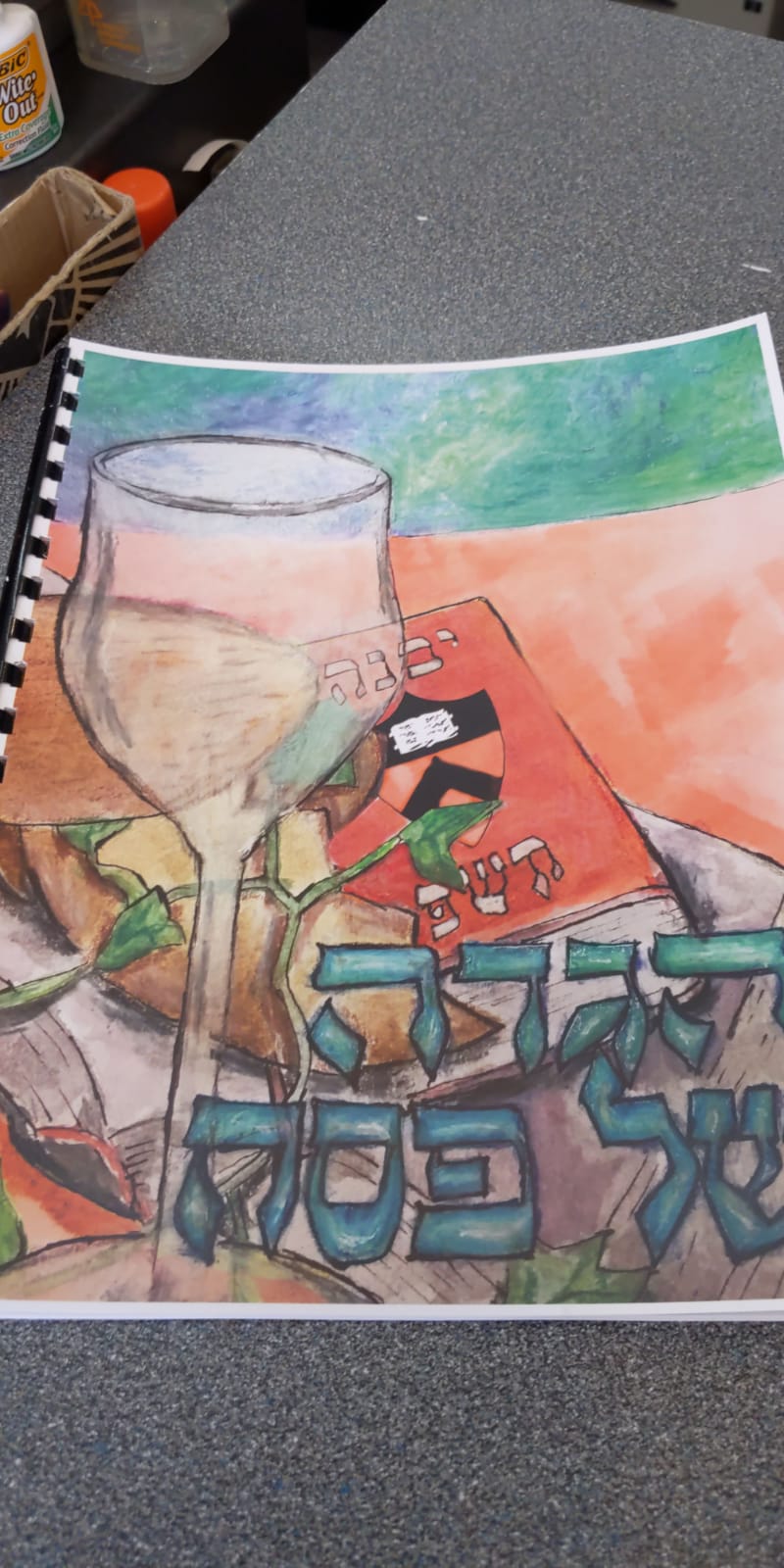
- Rabbi Nick Faguet (SMC – Santa Monica College) has been learning hilchot matza with a chabura since Chanukah. The goal was that they would study the text in depth, learn everything and culminate in having a matzah making event at the Faguet home the week before chag. The chabura has still been meeting via Zoom but were unable to get together and make the matzah. Since the Faguets’ had already invested the money and effort into getting all the supplies and shmurah flour, Rabbi Nick and Orit did a video tutorial for students and sent it to everyone in the chabura to participate virtually. See pictures and the video here: https://oujlic.org/smc-shmurah-matzah-chaburah/
- Several of Rabbi Reuven and Shira Boshnack’s alumni (Brooklyn College) “returned” for Women’s Health Night. Originally supposed to be live, 170 students, alumni and community members tuned in. The panelists, all Brooklyn OU-JLIC alumni, included a Dr, genetic counselor, physical therapist/ personal trainer, licensed dietician, and a mental health counselor specializing in body image and eating disorders.
- Rabbi Noam Friedman (Columbia University/Barnard College) gave a shiur on “Learning and Living During Crisis” to students and then on a different night for alumni. One alumni said, “Rav Noam, that was so excellent – thank you so much for preparing and sharing. It definitely made me miss the days of routine CU OU-JLIC Torah.”
- OU-JLIC Educators at Binghamton University, Rabbi Isaac and Tal Attia, organized a Bing Omer Torah Initiative where students post a dvar Torah each night.
- Rabbi Natan Greenberg, Rosh Yeshiva of Yeshivat Bat Ayin and father of Rabbi Arye Greenberg (OU-JLIC Brandeis) told the story of the Baal Shem Tov’s attempt to move to Eretz Yisrael. Brandeis students as well as students and educators from other campuses listened in to this story.
- Rabbi Jon Singer (OU-JLIC University of Chicago) gave a shiur on the Zoom seders and the halachic discussions on the matter.
- On Erev Pesach, Rabbi Joe Wolfson and Corinne Shmuel (OU-JLIC NYU) ran a how-to session for alumni running sedarim for the first time. It was both practically focused but also strangely beautiful given the emotion in the air.
- Yavneh on Campus’ Jeremy Tibbets and Rabbi Isaac Attia (Binghamton University) are leading a tefillah workshop four nights each week, called Tikon Tefilati.
- Yavneh on Campus has organized a new Chaburah Series where students will give a chaburah via zoom on a wide variety of topics three times a week and for every zoom that students join they will get a draw in a $25 Amazon Gift card.
A Sampling of Halachic Questions and Concerns
- I lost my job due to Corona and am now working for InstaCart. Am I allowed to buy Chametz products during Passover on my InstaCart runs for my customers?
- I am on the West coast, I sold my chametz (located in College Park) on chabad.org on NY time. When it was bought back after Pesach, it was still Pesach for me on the West coast. Is this considered chametz she’avar alav haPesach?
- According to the law (in Toronto) we can only have up to 5 people gather. Can we have our wedding without a minyan? What should we do?!?
- What should I do for my Shabbat Chatan/Shabbos Kallah?
- I’m in my mid-thirties and finally getting married. The wedding I have been dreaming of all my life was scheduled for August. Because social distancing might still be in effect, my chatan wants to move the wedding up and just do a small ceremony now so we can start our life together. If we do that, my sister won’t be able to come, my gown won’t be ready, we don’t have an apartment…and I feel rushed and shortchanged. The plans for August are already underway, but he does not want to wait. It’s causing a lot of tension between us – what should I do?
- I just discovered that my mom isn’t careful about toveling dishes. Am I allowed to eat off of them? Should I tovel them for her? Do I have an obligation to tell my father, who assumes she’s doing it, or is it better that he not know?
- Assuming all mikvos and natural bodies of water are closed, is toveling dishes in a swimming pool better than selling to a non-Jew?
- As a recovering alcoholic, who came out of rehab only a few weeks ago am I exempt from the 4 cups of wine at the seder.
- A student cannot have wine or grape juice because of insulin resistance. She wanted to know what to do for Arba Kosot.
- Can you do Hatarat Nedarim over zoom?
- I am in the army and involved in a national mission related to the Corona virus. I’m not exactly sure what the mission is, but the רבנות הצבאית has defined it as פיקוח נפש. If I’m called into action on Chag or Shabbat, I know that I can be מחלל שבת to get in a car to get to the mesima and to perform it, but am I also allowed to get into the car to get a ride back afterwards? Or would it be better to stay there (I’m not sure exactly where “there” would be) and find my way back after Shabbat/chag?
- Can I say vidui with my patients in the ICU?
- Can someone who temporarily can’t smell make the bracha on besamim for others, or should someone else make it?
- One particular student who had a yahrtzeit for his mother asked if he could do Kaddish or Yizkor over zoom. After a discussion with him, it was decided he would dedicate a shiur in her memory, and say a few words about his mother at the introduction to the shiur.
- What if the other family members at my seder want to do a zoom seder with other family members? Should I sit and not participate? Should I do an additional non-zoom seder afterwards that night?
- I am going to be alone for Pesach for three days and as you know I suffer from major depression. Am I allowed to use zoom to be able to join my parents for the sedarim?
- With campus closed, I’m home with my family who is not as religious as I am. They want to do a Zoom seder on the second night with my grandparents, who are in isolation. How do I navigate this while still observing chag? (The student asked this question, and then his parents called back to advocate for his participation!)
- Can I watch a zoom lecture that was recorded on chag if my professor who gave, recorded and posted the lecture is Jewish?
- Can one get a haircut during the sefira if the barbers open as the barbers are closed now?
- Do you think there will be heter to listen to music during the Omer this year? (Cuz we’re all stuck at home and it cld get depressing without music)?
- During the omer, if we say you can listen to pre-recorded music but not live music, can you listen to a DJ set that is pre-recorded music but is being mixed live?